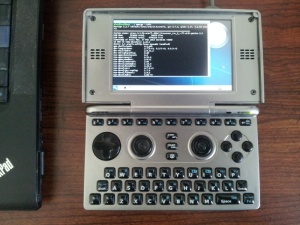Difference between revisions of "Gentoo"
From Pandora Wiki
(Added photo to page) |
|||
| Line 21: | Line 21: | ||
==== '''Partition''' the SD card ==== | ==== '''Partition''' the SD card ==== | ||
| − | # mkfs.ext2 -L boot /dev/mmcblk0p1# mkfs.ext4 -L gentoo -E stride=2,stripe-width=1024 /dev/mmcblk0p2# mkdir -p /mnt/gentoo# mount /dev/mmcblk0p2 /mnt/gentoo# mkdir /mnt/gentoo/boot# mount /dev/mmcblk0p1 /mnt/gentoo/boot | + | # mkfs.ext2 -L boot /dev/mmcblk0p1 |
| + | # mkfs.ext4 -L gentoo -E stride=2,stripe-width=1024 /dev/mmcblk0p2 | ||
| + | # mkdir -p /mnt/gentoo# mount /dev/mmcblk0p2 /mnt/gentoo | ||
| + | # mkdir /mnt/gentoo/boot | ||
| + | # mount /dev/mmcblk0p1 /mnt/gentoo/boot | ||
| Line 28: | Line 32: | ||
# tar xapvf gentoo-pandora-2014.05.tar.bz2 -C /mnt/gentoo# umount /mnt/gentoo/boot# umount /mnt/gentoo===''' Wireless ''' === | # tar xapvf gentoo-pandora-2014.05.tar.bz2 -C /mnt/gentoo# umount /mnt/gentoo/boot# umount /mnt/gentoo===''' Wireless ''' === | ||
# Click the wifi icon in the tray. | # Click the wifi icon in the tray. | ||
| − | |||
# In the window, press scan. | # In the window, press scan. | ||
| − | |||
# "Double-click" your network (hit right nub up, might take a few tries if it's not tuned) | # "Double-click" your network (hit right nub up, might take a few tries if it's not tuned) | ||
| − | |||
# Fill in the auth info and hit enter | # Fill in the auth info and hit enter | ||
| − | |||
# You should be connected now. It now will connect every time Gentoo starts. | # You should be connected now. It now will connect every time Gentoo starts. | ||
| Line 40: | Line 40: | ||
==== '''Installing packages''' ==== | ==== '''Installing packages''' ==== | ||
[http://gentoo.openpandora.org/packages available packages] | [http://gentoo.openpandora.org/packages available packages] | ||
| − | * Open a terminal and run:# $ su - | + | * Open a terminal and run: |
| − | + | # $ su - | |
| − | |||
| − | |||
# Password: | # Password: | ||
| − | |||
# emerge -avK htop | # emerge -avK htop | ||
| − | * | + | * Updating the system using binary packages: |
# emerge -auvDK @world | # emerge -auvDK @world | ||
| − | * | + | * Build portage tree to install prebuilt packages: |
# emerge --sync (will take a while the first time) | # emerge --sync (will take a while the first time) | ||
# emerge -av wgetpaste | # emerge -av wgetpaste | ||
Revision as of 19:28, 17 May 2014
- Razor-qt 0.5.2 desktop
- Over 500 pre-built packages, including: Firefox 29.0, GIMP 2.8.10, QtCreator 2.8.1, gdb 7.6.2, Valgrind 3.9.0, gcc 4.7.3
- All the packages were built for Cortex-A8 (softfp), mostly Gentoo arm stable
Contents
Installation requirements
- Pandora All versions fine?
- SD card Minimum 2GB
Download the gentoo image
Partition the SD card
- mkfs.ext2 -L boot /dev/mmcblk0p1
- mkfs.ext4 -L gentoo -E stride=2,stripe-width=1024 /dev/mmcblk0p2
- mkdir -p /mnt/gentoo# mount /dev/mmcblk0p2 /mnt/gentoo
- mkdir /mnt/gentoo/boot
- mount /dev/mmcblk0p1 /mnt/gentoo/boot
Extract Gentoo onto the SD card partitions
- tar xapvf gentoo-pandora-2014.05.tar.bz2 -C /mnt/gentoo# umount /mnt/gentoo/boot# umount /mnt/gentoo=== Wireless ===
- Click the wifi icon in the tray.
- In the window, press scan.
- "Double-click" your network (hit right nub up, might take a few tries if it's not tuned)
- Fill in the auth info and hit enter
- You should be connected now. It now will connect every time Gentoo starts.
Installing packages
- Open a terminal and run:
- $ su -
- Password:
- emerge -avK htop
- Updating the system using binary packages:
- emerge -auvDK @world
- Build portage tree to install prebuilt packages:
- emerge --sync (will take a while the first time)
- emerge -av wgetpaste
